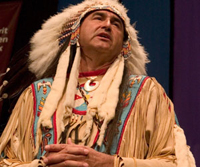A renowned Native American leader appealed to the newly created World Communion of Reformed Churches to establish a truth and reconciliation-like commission to “seek ways to make restitution to tribal people” for the churches’ complicity in “co-opting the Bible as a tool of colonialism and imperialism” in North America over the last 400 years.
Richard Twiss, a Lakota/Sioux originally from South Dakota and now living near Portland, Ore., said such a commission — comprising indigenous people from North America and the global South — is necessary to overcome “cowboy theology,” which he said has perpetuated “a distinct evangelical bias against Native and indigenous culture and ways.”
The “demonizing” of Native religious expressions means that “most (Native American) people reject Christianity because they consider it a white man’s religion,” Twiss said, “and it breaks my heart because Jesus is the hope of the world in all its brokenness.”
Twiss, who became Christian in 1974 while in the depths of drug and alcohol addiction, said “following Jesus started out very simple ... but then becoming a Christian became very complicated” as institutionalized churches insisted that Native American cultural and religious expressions were unacceptable. “I had to change my clothes, cut my hair, play different musical instruments — just a drum wasn’t good enough anymore. We were never allowed and never learned to contextualize the gospel in our culture,” he said.
The story of Native American suppression “is the worst occurrence of ethnic cleansing and genocide in the history of the world,” Twiss said. War and disease reduced the Native population in North America from some 50 million in 1400 to barely 230,000 in 1895. “But perhaps what makes the story most tragic is that so much of this was the result of the misappropriation of the biblical narrative that was co-opted as a tool of colonial imperialism.”
But Twiss sees signs of hope in the emerging missiological model called “missio Dei” (“mission of God”), which, he said, “points to the radical communal nature of God” rather than focusing on the institutional nature of the church.
“God’s very nature is missionary. It is not primarily about the propagation or transmission of intellectual convictions, doctrines, moral commands, but rather about the inclusion of all creation in God’s overflowing, superabundant life of communion,” he said.
In “missio Dei,” Twiss said, “indigenous people find a place of identity, belonging, value, peace, justice and affirmation — Shalom. Can we re-imagine a new or changed future where people are living out their faith in Jesus in light ... together as fellow learners and co-equal participants in the life, work and mission of Jesus?”

